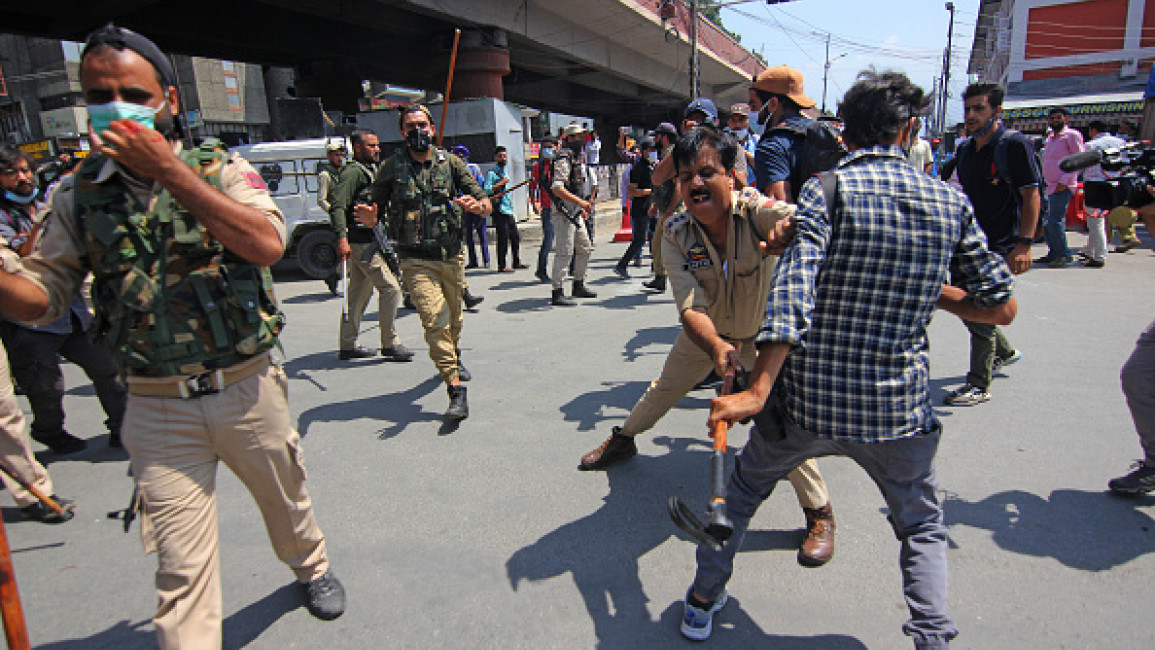Indian police arrest Kashmir journalist over 'anti-national' content
Police in Indian-administrated Kashmir have arrested a young journalist on accusations of publishing "anti-national content", police said, in a widening crackdown against media in the disputed region.
Fahad Shah, the editor of news portal Kashmir Walla, was summoned for questioning at a police station in southern Pulwama town on Friday and later arrested there, police said.
In a statement late on Friday confirming Shah’s arrest, police said he was identified among "some Facebook users and portals" that had published "anti-national content", without specifying the content.
It said such content was posted with "criminal intention to create fear among [the] public" and could "provoke the public to disturb law & order". It also said such content was “tantamount to glorifying the terrorist activities".
The case relates to a gunfight between rebels trapped inside a civilian home and Indian troops in Pulwama on 30 January.
Police had said a Kashmiri rebel commander was killed in the fighting along with a Pakistani militant and another local militant.
They described the fourth slain teenage boy, the house-owner’s son, as a "hybrid" militant, a term authorities began using last year for alleged militants with no police record and who operate as civilians.
Kashmir Walla carried a series of reports following the gunfight, presenting both sides of the story.
One video report quoted family members of the slain teenage boy refuting the police claim.
Another video quoted the boy’s sister contradicting an earlier statement from the family.
Shah was arrested under India's harsh anti-terror and sedition laws, which include punishment of up to seven years.
Shah and other reporters associated with Kashmir Walla have been questioned for their reporting by police several times in the last few years.
Kashmir is divided between India and Pakistan and both claim it in full. Since 1989, a full-blown armed rebellion has raged in Indian-administrated Kashmir seeking a united Kashmir- either under Pakistani rule or independent of both countries.
The region is one of the most heavily militarised in the world. Tens of thousands of civilians, rebels and government forces have been killed in the raging conflict.
Journalists have long contended with various threats in Indian-controlled Kashmir and found themselves caught between warring sides.
But their situation has gotten dramatically worse since India revoked the region’s semi-autonomy in 2019, throwing Kashmir under a severe security and communication lockdown and the media in a black hole.
A year later, the government’s new media policy sought to control the press more effectively to censure independent reporting.
Dozens have been arrested, interrogated and investigated under harsh anti-terror laws. Fearing reprisals, local press has largely wilted under pressure.
There have been press crackdowns in the region before, especially during periods of mass public uprisings. But the ongoing crackdown is notably worse.
Last month, police arrested journalist Sajad Gul after his single tweet linked a video clip of a protest against Indian rule, following a Kashmiri rebel’s killing.
Additionally in January, a few journalists supportive of the Indian government - with assistance from armed police - took control of the Kashmir Valley’s only independent press club.
Authorities shut it down a day later, drawing sharp criticism from journalist bodies.
Meanwhile, the New York-based Committee to Protect Journalists asked Indian authorities to “immediately and unconditionally” release Shah and “drop any investigation into his work and cease detaining members of the press.”
Steven Butler, CPJ’s Asia program coordinator, said in a statement the arrest “shows Jammu and Kashmir authorities’ utter disregard for press freedom and the fundamental right of journalists to report freely and safely.”
"Authorities must immediately release Shah, and all other journalists behind bars, and cease detaining and harassing journalists for simply doing their jobs," he said.



